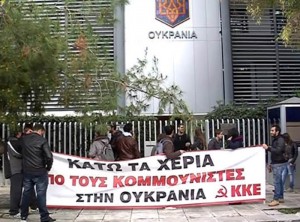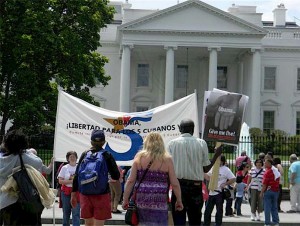www.resistenze.org  – pensiero resistente – dibattito teorico – 25-03-14 – n. 491
Zoltan Zigedy |Â zzs-blg.blogspot.it
Traduzione per Resistenze.org a cura del Centro di Cultura e Documentazione Popolare
11/03/2014
Per parafrasare de Maistre, ogni partito politico ha la leadership che merita. E’ la fiducia nella saggezza di questa massima che mi impedisce di commentare ampiamente lo sforzo di allontanamento dal marxismo-leninismo da parte del Presidente Sam Webb e degli altri dirigenti del Partito Comunista USA. Mentre la militanza continua a ridursi – al di là degli “amici” su internet e dei “mi piace” – non resta che meravigliarci della ostinata fedeltà degli iscritti rimasti, una lealtà forse mutuata dai tempi in cui il partito era ovunque sotto un fuoco incrociato. Ma oggi il partito non è sotto attacco da parte di alcuno, soprattutto perché tutto il corpo del partito si adopera per sostenere disinteressatamente il Partito Democratico nelle tornate elettorali e nel pedissequo appoggio alla AFL-CIO [maggiore sindacato Usa] nelle stagioni non elettorali.
A quanto pare sono in corso dei cambiamenti nel CPUSA mentre si avvicina la Convention nazionale di giugno. Ci sarà un cambio di leadership che purtroppo non sembra sarà accompagnato da un cambiamento di prospettiva ideologica. Tuttavia, alcuni nutrono una infondata “speranza” che paralizza il dissenso.
Si parla anche di far cadere i riferimenti al “Comunismo”, la barriera estrema, se si dà credito ai Webbisti, che impedisce al CPUSA di diventare un partito di massa. Per una onesta discussione critica delle più recenti riflessioni di Sam Webb, si veda l’articolo su http://houstoncommunistparty.com/the-poverty-of-ideology/.
A parte il suo continuo declino, il CPUSA conta, seppur con la sua voce flebile, come massima autorità presso la sinistra statunitense sulle questioni relative al movimento comunista internazionale. Recentemente, Sue Webb, che ha rappresentato il CPUSA all’Incontro internazionale dei Partiti comunisti e operai tenutosi a Lisbona nel novembre dello scorso anno, ha fornito un rapporto sull’incontro, evidenziando le valutazioni e le prospettive del CPUSA e di altri partiti sulla situazione attuale e sulla via da seguire.
Gran parte del commento di Sue Webb è un attacco velato al Partito Comunista di Grecia (KKE), con il pretesto di sostenere la diversità e l’indipendenza del movimento internazionale. Allo stesso tempo, sfrutta le differenze tra i partiti per giustificare l’allontanamento del CPUSA dal marxismo-leninismo.
Certo il KKE non ha bisogno di nessuno per difendere il suo onore e le sue posizioni, poiché è sommamente in grado di farlo autonomamente. Ma è importante che tutti i comunisti e i simpatizzanti del comunismo sappiano esaminare attentamente e criticamente gli approcci rappresentati a Lisbona. Il commento di Sue Webb fallisce gli standard di obiettività .
Webb suggerisce, in modo dispregiativo, che il KKE con ostinazione e irragionevolezza abbia impedito l’adozione di una dichiarazione finale unitaria: “Le critiche del partito greco erano così forti da respingere e bloccare l’adozione di qualsiasi dichiarazione finale consensuale che riassumesse il pensiero della conferenza. In tal modo, il partito greco e i suoi sostenitori di pochi altri paesi si sono posti chiaramente in contrasto con il pensiero e le politiche della stragrande maggioranza dei partiti rappresentati in assemblea”.
Nel contempo Webb ha illustrato le diverse strade intraprese dai vari partiti e la loro relativa autonomia da una singola via, citando Lenin copiosamente e facendo riferimento all’affidamento del suo partito alle “proprie esperienze e condizioni di lotta”. In altre parole, ha biasimato il KKE di non aderire alla volontà degli altri, sulla base delle “proprie esperienze e condizioni di lotta”. Apparentemente, Webb non percepisce alcuna incoerenza nell’insistere sulla vecchia linea euro-comunista della via nazionale al comunismo, mentre rimprovera il KKE per la sua posizione indipendente e di principio all’incontro di Lisbona.
L’accusa di istigare la disgregazione è particolarmente inconsistente dato il grande ruolo riconosciuto al KKE nel rilancio degli incontri, delle conferenze e degli scambi internazionali. Nel resoconto semplicistico di Sue Webb viene smarrito il contributo particolare che il KKE porta in ogni discussione sul percorso verso il socialismo. Senza entrare nel merito delle sue conclusioni, occorre rispettare la profonda analisi in cui il KKE si è impegnato riguardo il crollo dei partiti comunisti europei di massa dopo la seconda guerra mondiale. Mentre la maggior parte dei partiti si sono trovati alle prese con le lezioni connesse alla sconfitta dell’Unione Sovietica e delle repubbliche popolari dell’Est Europa, pochi hanno esplorato, nella misura in cui si è impegnato il KKE, le conseguenze teoriche del pressoché completo auto-dissolvimento dei maggiori partiti comunisti di massa in Italia, Francia e Spagna. Il processo di svuotamento del marxismo-leninismo nei partiti comunisti e operai non al governo è iniziato ben prima della caduta del potere sovietico. E’ il KKE che trae i più profondi insegnamenti da questa esperienza. Webb lo ignora completamente.
Non cimentarsi con le lezioni conseguenti il crollo del socialismo nell’Europea dell’Est e il fallimento dell’Euro-Comunismo porta a una lettura unilaterale, distorta della strada che abbiamo davanti.
E’ in questo contesto che il KKE confuta la posizione secondo la quale vi sarebbero delle “tappe” intermedie tra capitalismo e socialismo. Dopo la Seconda guerra mondiale, molti partiti presagirono uno stadio antimonopolista nella transizione al socialismo. Altri partiti cercarono di costruire una fase fondata su una “democrazia di tipo nuovo”, su un sistema di regole che non era né borghese né socialista. Queste strategie comportarono una attenzione sulla lotta parlamentare e di collaborazione con tutte le forze anticapitaliste e antimonopoliste. Il “compromesso storico” italiano rappresentò il culmine simbolico di questa prospettiva, ingaggiando una strategia che aprì la porta all’imborghesimento del Partito Comunista Italiano (PCI) e di conseguenza alla sua inevitabile scomparsa.
Uno degli spacciatori ideologici di questo approccio, Giorgio Napolitano, dimostra, con la stessa traiettoria della sua vita, la crudele tragedia del fallimento del PCI: membro di un gruppo giovanile fascista all’università , Napolitano abbracciò la resistenza, aderì al PCI, assunse un ruolo di primo piano nella nuova direzione e oggi regna come Presidente della Repubblica borghese italiana. Con civiltà e dignità misurate, ha legittimato il governo del farsesco-fascista Silvio Berlusconi. Le sue numerose onorificenze, decorazioni e premi testimoniano la sua abnegazione al capitalismo.
In un’intervista nel 1975, Napolitano, allora portavoce economico del PCI, scansò abilmente le difficili domande poste da Eric Hobsbawm: “Credo che in qualsiasi paese il processo di trasformazione socialista anche nei regimi socialisti debba essere fondato su un’ampia base di consenso e partecipazione democratica… La mia tesi riguardo la sostenibilità dei principi e delle forme della vita democratica in un contesto di avanzamento al socialismo e nella costruzione della società socialista attiene più specificamente ai paesi dell’Europa occidentale in cui la democrazia borghese è nata, in cui le istituzioni rappresentative hanno una più o meno forte tradizione e dove hanno operato più o meno liberamente diverse correnti democratiche, ideologiche, culturali e politiche… [e] che sono caratterizzate in misura diversa… dalla presenza di gruppi intermedi consistenti tra il proletariato e la grande borghesia che controlla i principali mezzi di produzione”. A soli 30 dacché i comunisti giocarono un ruolo chiave nella caduta del dispotismo antidemocratico europeo, Napolitano celebra vigorosamente la dubbia euro-tradizione della democrazia borghese, mentre provvede opportunisticamente agli interessi dei ceti medi. Purtroppo, molti partiti comunisti indulgono ancora su queste illusioni. E’ questa prospettiva fallimentare che viene vigorosamente contrastata dal KKE.
Allo stesso modo, il partito spagnolo di massa, sotto la guida di Santiago Carillo, cadde nella quasi completa irrilevanza grazie al feticcio della democrazia borghese e assecondando gli strati non proletari. Carillo sostenne che “… il partito comunista dovrebbe essere il partito della libertà e della democrazia… Dobbiamo inserire nel nostro programma come parte integrante, non solo le rivendicazioni dei lavoratori, ma anche quelle di tutti i settori della società che sono sotto privilegiati”. Questi vacui e superficiali slogan servono altrettanto bene la borghesia che quelli inscritti nelle piattaforme dei moderni partiti borghesi parlamentari. Nessuna meraviglia che i lavoratori siano fuggiti a frotte dal PCE, comprendevano il marxismo molto meglio di quanto non facessero i dirigenti del Partito.
Riflettere su questi tragici errori di calcolo dovrebbe indurre ad ascoltare gli avvertimenti contro l’opportunismo pronunciati dal KKE:
“Li lascia indifesi contro l’opera corrosiva delle forze borghesi e opportuniste, che cercano di assorbire i Partiti comunisti nel parlamentarismo, di castrarli e renderli parte del sistema politico borghese, attraverso collaborazioni senza princìpi e la partecipazione a governi di gestione borghese con l’etichetta di sinistra o progressista, intrappolati nella logica della collaborazione di classe e del supporto ai centri imperialisti, come avviene ad esempio con i Partiti comunisti del cosiddetto Partito della Sinistra Europea e con altri che stanno seguendo lo stesso percorso”. (G. Marinos, membro dell’Ufficio politico del CC, KKE, In merito al 15° Incontro Internazionale dei Partiti Comunisti e Operai a Lisbona)
Nella scia della profonda crisi economica mondiale dai tempi della Grande depressione, l’idea che i Partiti comunisti e operai dovrebbero lottare per portare il capitalismo fuori dalle secche – per meglio “gestire” il capitalismo – è una strategia assurda, destinata a emarginare ulteriormente la prospettiva del socialismo. Se anche i comunisti (o i comunisti alleati con altri) potessero salvare il capitalismo, perché dovrebbero farlo?
Sue Webb non riesce a inquadrare le posizioni del KKE nel contesto di partigianeria di classe, un errore che garantisce confusione e malintesi. Non riesce a scorgere una differenza tra lotta per le riforme nel quadro del capitalismo e rifiuto di prendere le parti della classe borghese, una distinzione che il KKE segna in modo inequivocabile. Quando le riforme vanno a beneficio dei lavoratori – aumenti e miglioramenti in materia di pubblica istruzione, assistenza sociale, sanità pubblica, ecc, – i comunisti combattono più di chiunque e accettano incondizionatamente alleanze. Ma dove i lavoratori sono invitati a schierarsi con la borghesia – nel sacrificare salari e benefici per rendere il loro datore di lavoro più competitivo, nel boicottare i prodotti fabbricati da lavoratori stranieri – i comunisti sollecitano i lavoratori a starne fuori.
Sue Webb addebita al KKE di considerare le economie emergenti come rivali dell’imperialismo occidentale: “Viene respinta l’ipotesi che i BRICs… o altri paesi, come in America Latina, emergano come sfide per l’imperialismo occidentale”. Ma questo è assurdo: i comunisti vedono questi paesi come rivali imperialisti all’imperialismo occidentale, con i propri disegni sull’economia globale, i propri interessi espansionistici. Allo stesso tempo, i comunisti si oppongono alle aggressioni e alla guerra da parte delle potenze imperialiste in ogni caso e sotto ogni forma. Ad esempio, i comunisti si oppongono con fervore all’intervento degli Stati Uniti in Venezuela, si oppongono all’ingerenza di UE e USA in Ucraina. Tuttavia, non appoggiano le rispettive borghesie nazionali, in contrapposizione ad alcune organizzazioni “marxiste” che hanno oscillato o capitolato davanti a cambiamenti di regime o missioni “democratiche” in paesi come l’Iraq o la Libia.
Sue Webb sbeffeggia il rifiuto del KKE del termine “finanziarizzazione”. “Identificare la finanziarizzazione come una caratteristica particolare del capitalismo di oggi è un inganno, un diversivo. Il capitalismo è capitalismo”, ammonisce il KKE. Bisognerebbe chiedere a Webb, cosa sarebbe il capitalismo se non fosse capitalismo! Sono sicuro che Webb ha smarrito la nozione che l’esistenza di un capitalismo buono e un capitalismo cattivo è estranea al marxismo. La socialdemocrazia e i suoi simili cercano di trovare un capitalismo sano da cavalcare verso il socialismo. Naturalmente, sono in errore: il capitalismo non va in quella direzione.
Il profitto è la forza trainante del capitalismo, è impossibile immaginare il capitalismo senza profitto. La ricerca del profitto modella la traiettoria del capitalismo. Come un predatore rabbioso, il capitalista cerca profitti ovunque: nel settore dei beni strumentali, nel settore dei beni di consumo, nel settore dei servizi e nel settore finanziario. Il fatto che il settore finanziario abbia giocato un ruolo fondamentale nella ricerca del profitto in epoca recente getta scarsa luce sul funzionamento fondamentale del capitalismo. Piuttosto, consacrare l’attività finanziaria come specie unica del capitalismo offusca i meccanismi di base dell’accumulazione capitalistica. E non aggiunge nulla.
Che la crisi globale sia scoppiata dapprima nei centri finanziari capitalistici è innegabile. Ma il fatto che le eruzioni iniziali fossero il risultato di lunghi processi è altrettanto innegabile. I socialdemocratici vorrebbero farci credere che la crisi è stata causata da un comportamento aberrante, una insana fissazione per le manovre finanziarie a cui si possa porre rimedio attraverso la regolamentazione e le riforme. Questa è una sciocchezza. Questo non è il marxismo.
Così, è il termine “finanziarizzazione” a essere una truffa. Un termine gradito da chi è troppo pigro o troppo impaurito per esaminare il funzionamento interno di un sistema rapace.
Non è necessario abbracciare ogni prospettiva, ogni formulazione del KKE per riconoscere che sono loro che stanno prendendo l’iniziativa su questioni che sfidano il movimento comunista mondiale, stanno ponendo le domande difficili che sfidano le vecchie abitudini, gli assunti superficiali, le posizioni non vagliate. Sì, sfidano le credenze convenienti che rendono facile l’interazione con le altre forze di sinistra, ma lo fanno con onestà nel segno della tradizione comunista. Sì, non pongono in cima ai principi la necessità di trovare consenso-per-il-bene-del-consenso. Ma quelli di noi che vogliono ridare vitalità al movimento comunista devono apprezzare – e non disprezzare – il loro impegno disinteressato nel rilanciare un comunismo militante basato sulle fondamenta gettate da Marx e Lenin.
Con tutta la sua furia autocelebrativa di fuggire dal dogmatismo, dal settarismo e dalle idee “aliene”, il partito di Sue Webb è in procinto di cadere nell’oblio. Come nel caso di una nave che affonda, la direzione del CPUSA si disferà prontamente del suo bagaglio. Finiti gli archivi del partito, il giornale del partito, le librerie di partito, le organizzazioni di partito, la formazione e anche le riunioni di partito. Andranno anche i simboli del partito, i principi organizzativi, l’ideologia e anche il saluto a pugno chiuso. Al loro posto si affermano le comunicazioni Facebook e Twitter, le videoconferenze, la causa comune con i gruppi liberali nello sforzo obbligatorio di sostenere le campagne elettorali del Partito Democratico.
Sue Webb dice: “Le prospettive e le politiche del nostro partito si adattano bene alla corrente principale del movimento comunista internazionale come espresso nella riunione di Lisbona dello scorso novembre”.
Magari fosse così! La leadership attuale del CPUSA respinge approcci audaci per raggiungere il socialismo nell’attesa passiva della venuta di un secondo Franklin Delano Roosevelt e del New Deal. Tracciano la loro linea strategica sulle misure difensive disperate necessitate dall’ascesa del fascismo 80 anni fa: un fronte temporaneo con le forze non di classe, che hanno rapidamente tradito l’alleanza dopo la seconda guerra mondiale e la caduta del fascismo. Sam Webb e la sua cricca restano ancorati a tempi andati.
“Corrente principale del movimento comunista internazionale?” Io credo di no. Il movimento comunista internazionale sta crescendo di nuovo grazie, in parte, ai vivaci e franchi dibattiti circa la via da seguire, come è avvenuto a Lisbona. Mentre il consenso rimane illusorio, il processo di discussione è, tuttavia, chiarificatorio e unificante. Ma per i caduti nella rete dell’opportunismo, il futuro è tetro.














